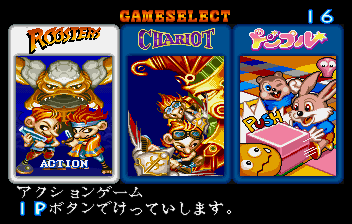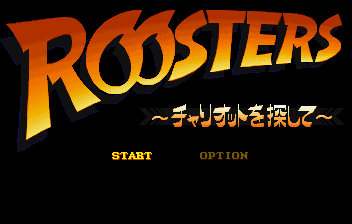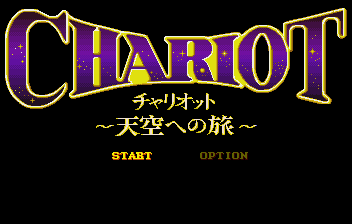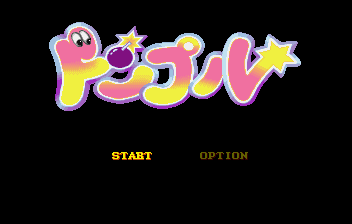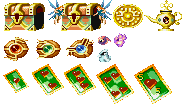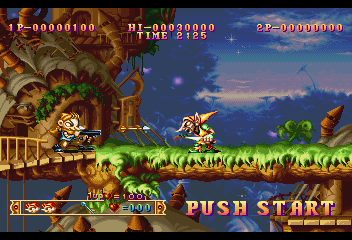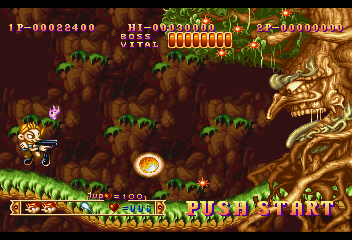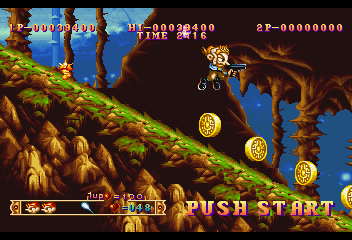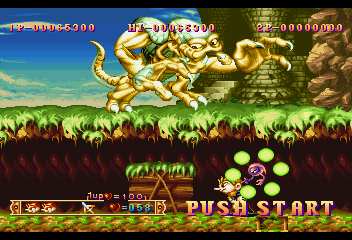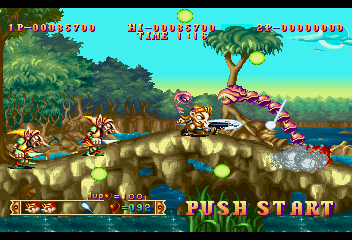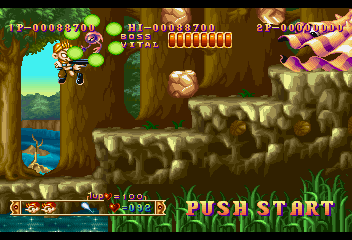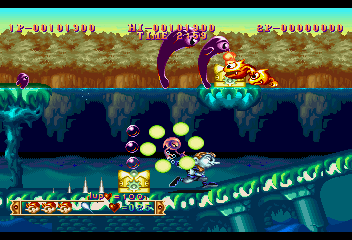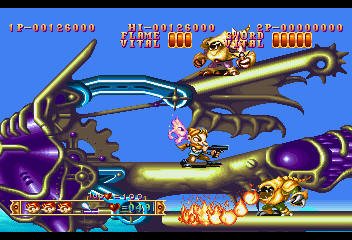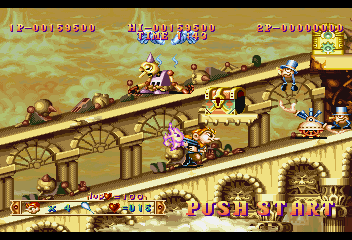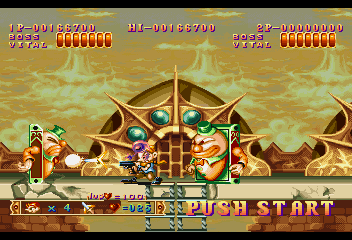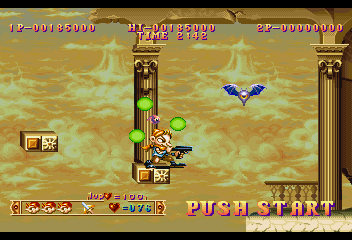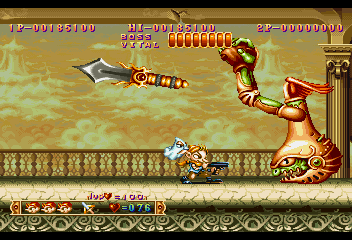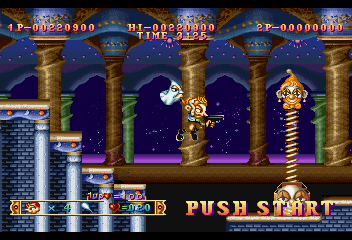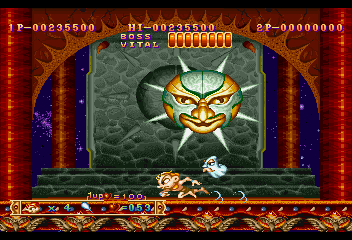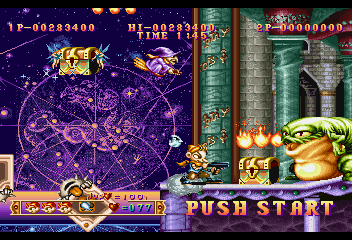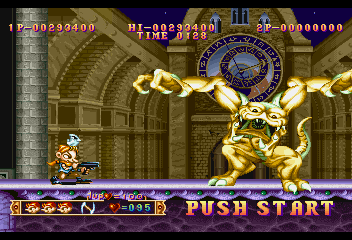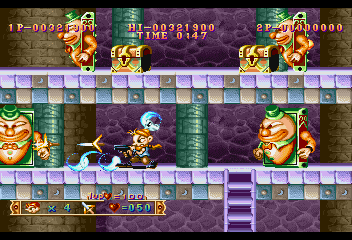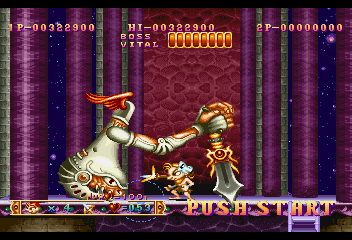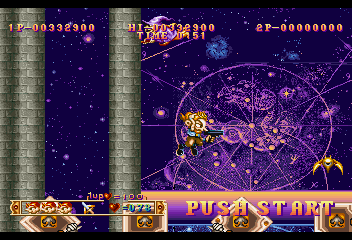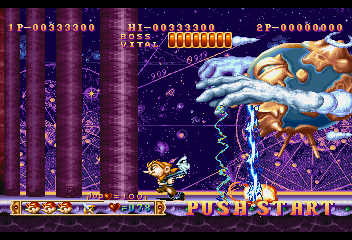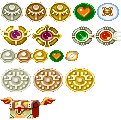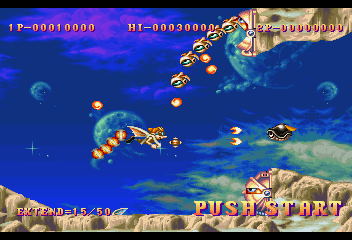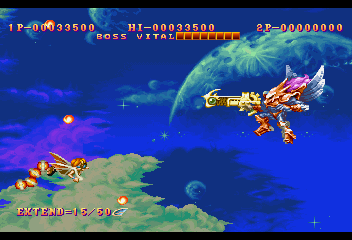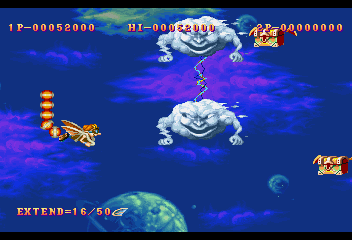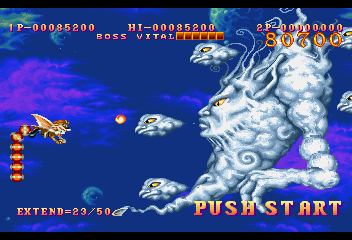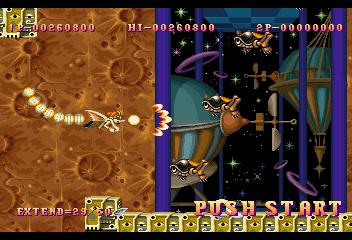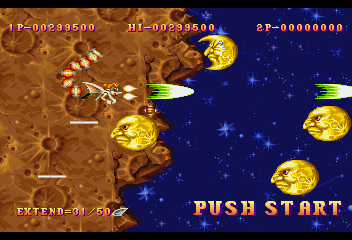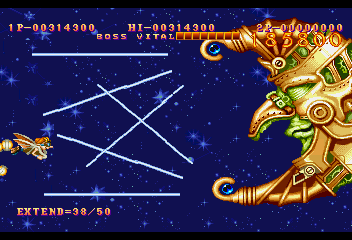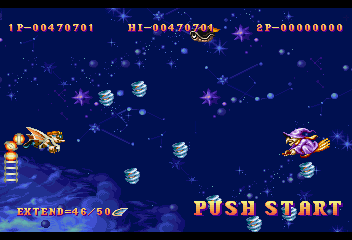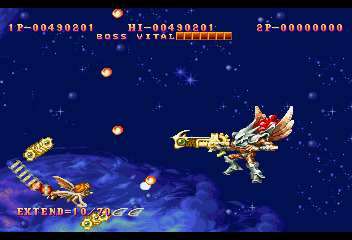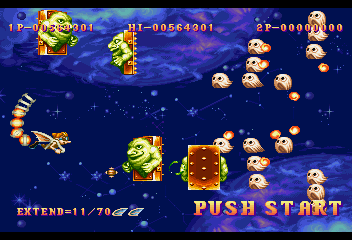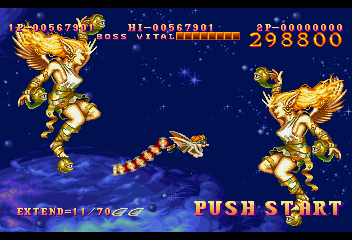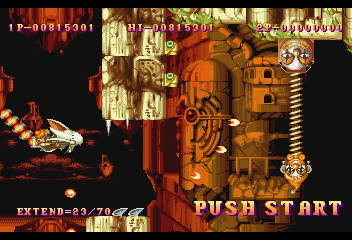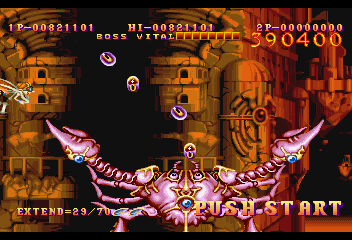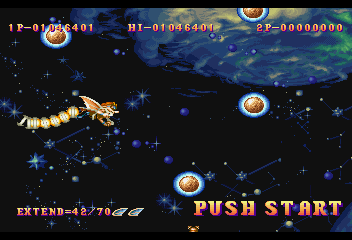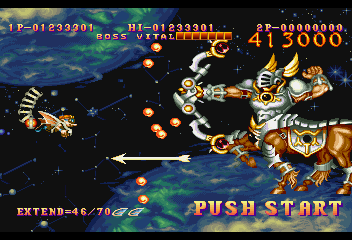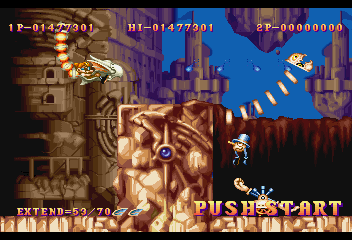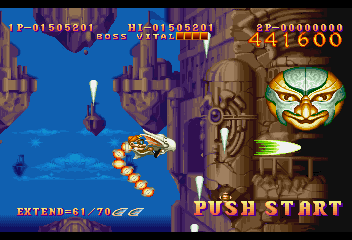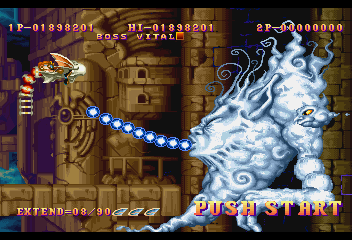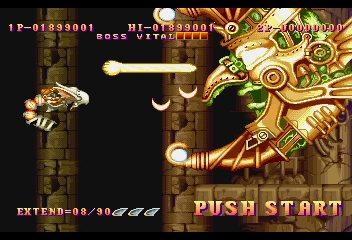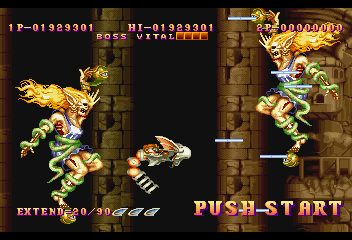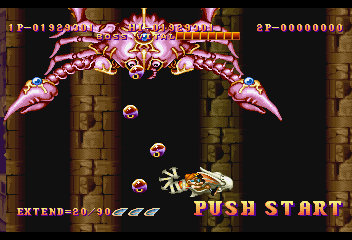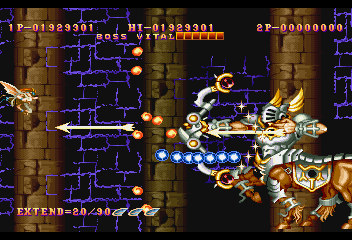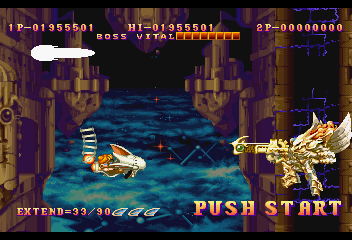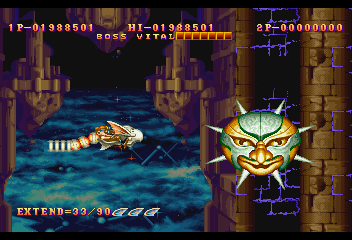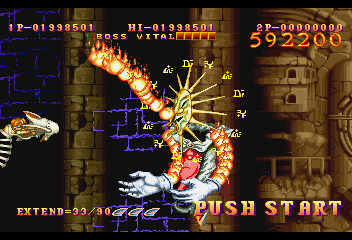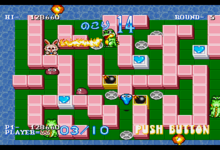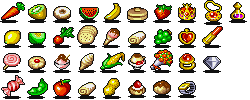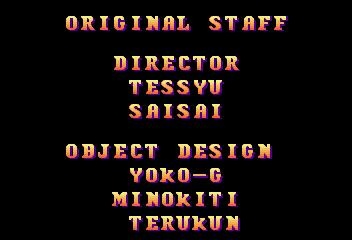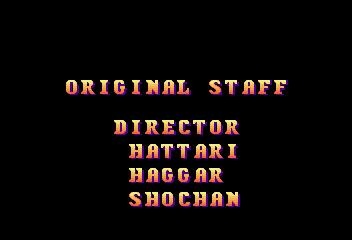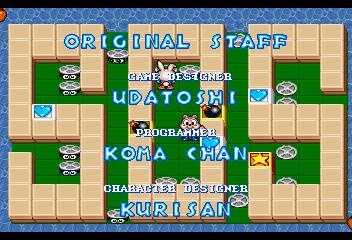Wonder 3 Arcade Gears
From Sega Retro
| ||||||||||
| Wonder 3 Arcade Gears | ||||||||||
|---|---|---|---|---|---|---|---|---|---|---|
| System(s): Sega Saturn | ||||||||||
| Publisher: Xing Entertainment[1] | ||||||||||
| Developer: MBA International[2] | ||||||||||
| Licensor: Capcom | ||||||||||
| Original system(s): Capcom CPS-1 | ||||||||||
| Developer(s) of original games: Capcom | ||||||||||
| Game total: 3 | ||||||||||
| Sound driver: SCSP/CD-DA (64 tracks) | ||||||||||
| Genre: Compilation, Variety (バラエティ)[3], Table[4] | ||||||||||
| Number of players: 1-2 | ||||||||||
| ||||||||||
|
Wonder 3 Arcade Gears (ワンダー3 アーケードギアーズ) is a Sega Saturn conversion of a 1991 arcade game by Capcom, Wonder 3 (known as Three Wonders outside of Japan). This Saturn version came with a free Gamest Gears magazine.
Contents
Games included
As in the original arcade machine, there are three games, each more brief or simplistic than a full arcade release. Roosters and Chariot feature the same characters and the same world, while Donpuru is unrelated.
- Roosters: Chariot o Sagashite (ルースターズ ~チャリオットを探して~)
- Chariot: Tenkuu e no Tabi (チャリオット ~天空への旅~)
- Donpuru (ドンプル)
Story
Roosters: Chariot o Sagashite
The villain Gaia has stolen the Chariot of Light and begun turning people into wooden statues. The hobbits Lou and Siva must defeat him to return their friend Sena to human form.
Chariot: Tenkuu e no Tabi
After defeating Gaia, Lou and Siva recover the Chariot of Light and use it to find Lar, who is holding the Princess of Ashtar in his castle after kidnapping her.
Gameplay
Roosters: Chariot o Sagashite
Roosters: Chariot o Sagashite is an action platform game similar to Ghouls'n Ghosts, with elements inspired by Strider. Players control the hobbits Lou and Siva, who are on a quest to defeat Gaia and save their friend Sena. Player one plays as Lou, and player two can join the game at any time by pressing START and play as Siva. When playing with two players, the screen only scrolls if both players are moving.
The characters move with ![]() or
or ![]() and crouch with
and crouch with ![]() . They jump with
. They jump with ![]() and jump down from thin platforms with
and jump down from thin platforms with ![]() +
+![]() . They can dash along the ground to move more quickly and evade enemies with
. They can dash along the ground to move more quickly and evade enemies with ![]() +
+![]() . If they are on a thin platform, jumping off has precedence over dashing, but
. If they are on a thin platform, jumping off has precedence over dashing, but ![]() +
+![]() and
and ![]() +
+![]() can also be used to dash. They can grab some platforms from underneath by jumping in front of them, then pull themselves up with
can also be used to dash. They can grab some platforms from underneath by jumping in front of them, then pull themselves up with ![]() or climb across with
or climb across with ![]() or
or ![]() .
.
The characters attack with ![]() or
or ![]() . Lou is armed with a gun that shoots arrows and Siva throws knives. While standing, projectiles can be fired in three directions (left and right, depending on which direction the character is facing, or directly above with
. Lou is armed with a gun that shoots arrows and Siva throws knives. While standing, projectiles can be fired in three directions (left and right, depending on which direction the character is facing, or directly above with ![]() +
+![]() /
/![]() ). While jumping, arrows can also be fired directly downward with
). While jumping, arrows can also be fired directly downward with ![]() +
+![]() /
/![]() . The characters can find items that upgrade their projectiles. They can also find "options," similar to a shoot-'em-up, which are magical companions that follow them around and augment their attacks with special attacks of their own.
. The characters can find items that upgrade their projectiles. They can also find "options," similar to a shoot-'em-up, which are magical companions that follow them around and augment their attacks with special attacks of their own.
Lou and Siva have two hit points. They lose their clothes after taking the first hit of damage, then they lose a life after taking damage without their clothes. If the player has extra lives remaining, the character is revived immediately. When revived, the character is carried down from the sky by an owl, and the player can move the owl with ![]() or
or ![]() and drop the character with
and drop the character with ![]() ,
, ![]() , or
, or ![]() (or the character is dropped automatically after a short time). Stages also have a time limit, with the players losing a life if time runs out. The characters retain their special weapon after losing a life, and if they had an option equipped, the item for it hovers near them to be collected again. Extra lives can be earned by collecting hearts. If the player runs out of lives, the game can be continued at the cost of a continue.
(or the character is dropped automatically after a short time). Stages also have a time limit, with the players losing a life if time runs out. The characters retain their special weapon after losing a life, and if they had an option equipped, the item for it hovers near them to be collected again. Extra lives can be earned by collecting hearts. If the player runs out of lives, the game can be continued at the cost of a continue.
The number of starting lives and continues, as well as the difficulty level (Beginner, Normal, Expert, Professional) can be chosen at the options menu before starting the game.
Items
| Treasure Chest | |
|---|---|
| Shoot open treasure chests to reveal an item. Some chests are flying. | |
| Cards | |
| Cards contain 1 to 5 hearts. The value is shown on either side of the card. Collect 100 hearts for an extra life. Cards are found in chests or awarded after defeating a boss. | |
| Coin | |
| Awards 1,000 bonus points. | |
| Lamp | |
| Restores Lou or Siva to full health or awards 10,000 points if already at full health. | |
| Tail Shot | |
| Changes the character's weapon to the Tail Shot, spinning blades that break into two pieces and fly in both directions laterally. | |
| Hyper Shot | |
| Changes the character's weapon to the Hyper Shot, knives with boomerangs that splinter off and arc downward. | |
| Bound Shot | |
| Changes the character's weapon to the Bound Shot, energized arrows that refract ricocheting laser blasts after hitting something. | |
| Corkscrew | |
| Equips an option that surrounds itself in energy balls that shoot off in every direction and seek enemies whenever the character attacks. | |
| Firestorm | |
| Equips an option that spews a stream of fireballs whenever the character attacks. | |
| Chilly | |
| Equips an option that shoots gusts of wind that roll along the ground whenever the character attacks. |
Stages
The first three stages are divided into two areas, each punctuated by a boss encounter. The fourth stage only has one area, and the last stage has three areas.
| Stage 1 | |
|---|---|
| Stage 2 | |
| Stage 3 | |
| Stage 4 | |
| Stage 5 | |
| The first two areas reprise the bosses of the first and third stages. The last area ends in a fight against Gaia. |
Chariot: Tenkuu e no Tabi
Chariot: Tenkuu e no Tabi is a horizontally scrolling shoot-'em-up that serves a sequel to Roosters. Many assets from that game are reused, but the game features new bosses, several of which are based on Zodiac signs. Lou and Siva ride the "Chariots of Light," magical gliders, through the skies. Once again, player one plays as Lou and player two can join the game at any time to control Siva by pressing START .
The characters can moved in any direction using the D-Pad. They shoot their main weapons with ![]() or
or ![]() . There are two choices of main weapons, Wide and Rapid, which can be switched and upgraded by collecting power-ups. There is only limited rapid-fire when using the Rapid weapon. The characters also have secondary weapons, stored as special pods in a flexible tail behind the chariots. The tail is invulnerable and can be used to attack enemies. It curls in the opposite direction to the character's movement. The tail shot is fired with
. There are two choices of main weapons, Wide and Rapid, which can be switched and upgraded by collecting power-ups. There is only limited rapid-fire when using the Rapid weapon. The characters also have secondary weapons, stored as special pods in a flexible tail behind the chariots. The tail is invulnerable and can be used to attack enemies. It curls in the opposite direction to the character's movement. The tail shot is fired with ![]() , which consumes three pods. Pods regenerate after a short duration (or when their item is collected), up to a maximum of seven. The tail shot differs depending on which main weapon is equipped.
, which consumes three pods. Pods regenerate after a short duration (or when their item is collected), up to a maximum of seven. The tail shot differs depending on which main weapon is equipped.
The characters lose a life when they take a hit from an enemy (but colliding with terrain does not harm them, unless they are trapped by the screen). There is a shield item that gives them the ability to sustain an additional hit. The characters revive immediately if the player has extra lives remaining, with their weapon; otherwise, a continue must be expended. Weapons and pods appear after the character's chariot is destroyed so they can be collected again. Extra lives can be earned by collecting hearts. The amount of hearts that need to be collected is initially 50 but increases by 20 every time an extra life is earned.
The number of starting lives and continues, as well as the difficulty level (Beginner, Normal, Expert, Professional) can be chosen at the options menu before starting the game.
Items
Stages
| Stage 1 | |
|---|---|
| Stage 2 | |
| Stage 3 | |
| Stage 4 | |
| Stage 5 | |
| Stage 6 | |
| Stage 7 | |
Donpuru
Donpuru is a puzzle game similar to Sega's Pengo or Capcom's own Pirate Ship Higemaru. Players control either the rabbit Don-kun (player one) or the squirrel Pull-kun (player two). As with the other games, it supports two-player simultaneous play, with a second player able to join a game in progress by pressing START . Each round is a small maze set on a grid, and the goal is to squash all of the monsters in the round by pushing blocks towards them.
The characters can change the direction that they are facing or move in any direction using the D-Pad. The walls of the maze are constructed of blocks, and the characters can push the block that they are facing by pressing ![]() or
or ![]() . If the block is next to another block or the edge of the tiled area, it is destroyed. Otherwise, the block slides along the floor until it hits a wall or the edge of the tiled floor. Monsters caught by a sliding block are pushed by it, so they can be crushed between a sliding block and a stationary one (with more points awarded for eliminating multiple monsters in a single move). Blocks can also be pushed to rearrange to maze to move around easier.
. If the block is next to another block or the edge of the tiled area, it is destroyed. Otherwise, the block slides along the floor until it hits a wall or the edge of the tiled floor. Monsters caught by a sliding block are pushed by it, so they can be crushed between a sliding block and a stationary one (with more points awarded for eliminating multiple monsters in a single move). Blocks can also be pushed to rearrange to maze to move around easier.
Characters and monsters can walk outside of the tiled floor to the area that borders the maze, but blocks cannot be moved outside of the tiled area. Boulders patrol the border area to discourage players from staying outside of the maze for too long.
Monsters are initially hidden under manhole covers, which are placed randomly. They pop up several at a time during the round to roam the maze. Monsters peek out from the manhole before they emerge. Moving a block can sometimes reveal another manhole. Types of monsters include colorful jellybean-like foes and fire-breathing dragons that can burn Don and Pull to a crisp. A counter at the top of the screen shows how many monsters are remaining. When there is only one monster left, the word "Escape" flashes on screen and the last monster runs away. It is automatically defeated after a short duration, so players can squash it for points or simply avoid it. When all of the monsters are cleared, the round ends. A time bonus is awarded for finishing the round in less time.
There are special blocks, such as bomb blocks that explode in an area and stun enemies and star blocks that drop items when they are destroyed. Items can be collected for bonus points. Collecting food and jewelry items (which can be done across multiple rounds) awards an extra life. Initially, 10 food items award an extra life, but the amount required increases each time. There is a counter in the bottom of the screen that shows how many items need to be collected for an extra life.
The characters lose a life if they touch an enemy (or the dragon's fire breath). Stunned enemies are harmless and can be walked through. In a single-player game, the player must restart the round from the beginning. In two-player games, the character is revived without interrupting the round. The game ends if the player runs out of lives but can be continued.
The number of starting lives and continues, as well as the difficulty level (Beginner, Normal, Expert, Professional) can be chosen at the options menu before starting the game.
Blocks
| Block | |
|---|---|
| Regular blocks can be pushed into enemies to squash them or pushed into each other to destroy them and clear a path. Their color varies depending on the round. | |
| Heart | |
| Heart blocks appear in every round. If all three are placed together in a line, it causes enemies to dance and become harmless for a short duration. | |
| Star | |
| Star blocks contain items, which are released if they are destroyed. | |
| Bomb | |
| Bombs explode when pushed into an enemy or another block, momentarily stunning all enemies in a radius. | |
| Manhole | |
| Monsters emerge from manholes over the course of the round. |
Items
| Food and Jewelry | |
|---|---|
| Collect food and jewelry items to earn an extra life. Initially, it takes 10 hearts to earn an extra life, but this amount increases by 10 every time an extra life is earned. Also awards bonus points, which increase as more items are collected.
Large food items occasionally appear in random locations on the maze, which count as multiple food items when collected. | |
| Elixir | |
| Temporarily freezes all enemies. |
Rounds
- Main article: Wonder 3 Arcade Gears/Maps.
There are 32 rounds total, divided into two "courses." Every two rounds, there is a short "intermission" animation.
The positions of blocks are the same for every playthrough, but the positions of manholes are randomized each time.
History
Legacy
The character Lou, who appears in both Roosters and Chariot, appeared as a guest character in Marvel vs. Capcom: Clash of Super Heroes, released for the Capcom CPS-2 arcade board in 1998 and the Sega Dreamcast in 1999.
Versions
The arcade version runs on the Capcom CPS-1 arcade board, using the 384x224 video mode. This size is not supported by the Saturn, so the port runs at 352x224. Because of this, the rounds in Donpuru scroll slightly horizontally, whereas the game had no scrolling in its original arcade incarnation.
Production credits
Roosters: Chariot o Sagashite
- Director: Tessyu, Saisai
- Object Design: Yoko-G, Minokiti, Terukun
- Scroll Design: Sadkiti, Harutti, Nisuko, Yama-chan
- Program: Saiko Yuki, CKY
- Music: T'Yomage
- Special Thanks: Nin, Sho
- Producer: Kihaji
- Executive Producer: Yoshio Kimura
- Producer: Amando Kuno
- Assistant: Shu Hirato
- Director: Toshikazu Iwasa
- Director Assist: Shingo Takahashi
- Main Programmer: Takashi Sugimoto
- CG Convert: Daisuke Hatakeyama, Seiji Kawakatsu
- Special Thanks: Masaya Nakamura, Mitsuhiro Sugihashi, Kazuyuki Inakoshi
Chariot: Tenkuu e no Tabi
- Director: Hattari, Haggar, Shochan
- Object Design: Kura, Yu-san, Efa
- Scroll Design: Kintaro, Maru-chan, Monchi
- Program: Dome, Ikechan, Ecchro!!
- Music: T'Yomage
- Special Thanks: Poo, Ju-oh
- Producer: Kihaji
- Executive Producer: Yoshio Kimura
- Producer: Amando Kuno
- Assistant: Shu Hirato
- Director: Toshikazu Iwasa
- Director Assist: Shingo Takahashi
- Main Programmer: Takashi Sugimoto
- CG Convert: Daisuke Hatakeyama, Seiji Kawakatsu
- Special Thanks: Mitsuhiro Sugihashi, Kazuyuki Inakoshi
Donpuru
- Game Designer: Udatoshi
- Programmer: Koma Chan
- Character Designer: Kurisan
- B.G. Designer: Kuramoyan
- Sound Composer: T'Yomage
- Director: Kihaji-O
- Executive Producer: Yoshio Kimura
- Producer: Amando Kuno
- Assistant: Shu Hirato
- Director: Toshikazu Iwasa
- Director Assist: Shingo Takahashi
- Programmer: Seiji Kawakatsu
- CG Convert: Daisuke Hatakeyama
- Special Thanks: Mitsuhiro Sugihashi, Kazuyuki Inakoshi
Magazine articles
- Main article: Wonder 3 Arcade Gears/Magazine articles.
Promotional material
Physical scans
| Sega Retro Average | |||||||||||||||||||||||||||||||||||||||
|---|---|---|---|---|---|---|---|---|---|---|---|---|---|---|---|---|---|---|---|---|---|---|---|---|---|---|---|---|---|---|---|---|---|---|---|---|---|---|---|
|
| 65 | |
|---|---|
| Based on 7 reviews | |
Technical information
- Main article: Wonder 3 Arcade Gears/Technical information.
References
- ↑ File:W3AG Saturn JP Box Front.jpg
- ↑ http://gdri.smspower.org/wiki/index.php/MBA_International
- ↑ File:W3AG Saturn JP Box Back.jpg
- ↑ 4.0 4.1 https://sega.jp/history/hard/segasaturn/software_l.html#tab04 (Wayback Machine: 2019-12-07 02:59)
- ↑ Sega Saturn Magazine, "1998-11 (1998-04-10,17)" (JP; 1998-03-27), page 81
- ↑ File:Wonder 3 Saturn, Roosters credits.pdf
- ↑ File:Wonder 3 Saturn, Chariot credits.pdf
- ↑ File:Wonder 3 Saturn, Donpuru credits.pdf
- ↑ Edge, "July 1998" (UK; 1998-06-18), page 100
- ↑ Famitsu, "1998-03-13" (JP; 1998-02-27), page 1
- ↑ MAN!AC, "06/98" (DE; 1998-05-06), page 61
- ↑ Saturn Fan, "1998 No. 6" (JP; 1998-03-13), page 151
- ↑ Saturn Fan, "1998 No. 10" (JP; 1998-05-15), page 116
- ↑ Sega Saturn Magazine, "1998-08 (1998-03-20)" (JP; 1998-03-05), page 190
- ↑ Sega Saturn Magazine, "Readers rating final data" (JP; 2000-03), page 14
| Wonder 3 Arcade Gears | |
|---|---|
|
Main page | Comparisons | Maps | Magazine articles | Reception | Technical information | |
| Arcade Gears compilations | |
|---|---|
| Pu-Li-Ru-La/Arcade Gears (1997) | Gun Frontier Arcade Gears (1997) | Wonder 3 Arcade Gears (1998) | ImageFight & XMultiply: Arcade Gears (1998) | Edward Randy Arcade Gears (unreleased) |
